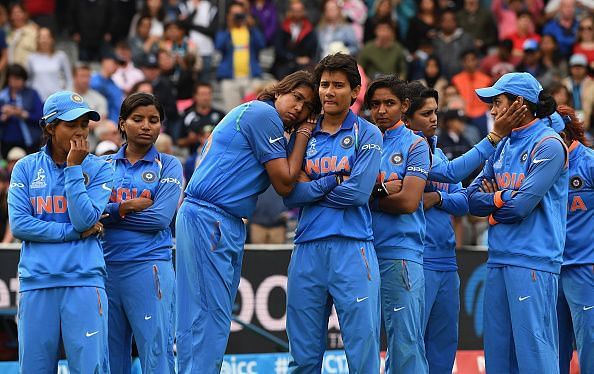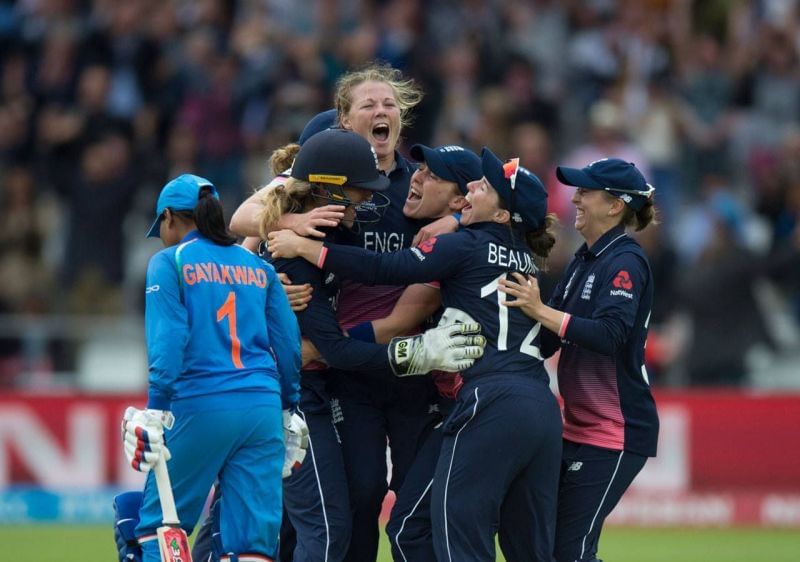
It wasn't a World Cup final

It wasn't a World Cup final. It certainly didn't seem like one; not the least to me. It was hence understandable, perhaps, that I could only turn on the television late into the second innings. A certain Harmanpreet Kaur, who had risen from anonymity to stardom in the semifinal with some 170-odd, had farmed the strike alongside a midget-sized lesser-talked-about opening bat, overshadowed by her more charming left-handed sister.
It was told to me that India had just lost the best bat in their history and that it was a poor judgement of a run. I scoffed and scorned thinking why would the best bat in history be run-out in such a haphazard fashion, that too in a World Cup final. It wasn't, hence, a World Cup final.
As I remained detached from what people around me were feeling and letting out with knee-jerk chest-thumping and profanities hurled at the opposition, all done in the name of uplifting the women's game, I laughed at their hypocrisy and savoured my own indifference.
You see, at times, a sport can be as much of a divider as it can be a leveller, and when nationalism is kept on a platter with a sport as the bait, most do tend to falter.
Back in the middle, in front of a packed Lord's cricket ground -- the only thing that made the game look like a World Cup final -- there were women playing conservative cricket. Loopy full tosses were being defended, pushed to the fielders, or left alone.
I scorned again. I thought, why don't they use their feet? People around me, as much of fans of the game as I am, jibbed, ebbed, and swore in frustration. As they did when the loose balls were put behind the fence.
If there was one thing common with all of what transpired on the field, it was that it was a one-day international game that drifted along with no relevance or knots attached to the past. I tried hard to recall the last time I'd seen these women play a final, but couldn't.
There were no parallels to be drawn from history, no incidents to be looked back at and no legends to compare these women with. Not from their own sex, at least. Outside, the whole of India was hell-bent on making this team win as if it defined the way they'll break their dawn or practice their religion.
The fanaticism was sky high, quite in contrast to the action on the field, which was devoid of fun, or to speak in a layman T20-maniac's words, maximums. The midget-sized Punam Raut brought up her fifty and it had just three fours.
Kaur's fifty -- the overnight legend, of whom more expectations were put in place than those from one's own self -- albeit much subdued from Derby, also had three fours. There were two maximums, but nah, that's not what legends are made of. The least certainly those who are pushed to the topmost echelons within the span of a weekend.
When she slogged one straight to deep square leg, immediately after reaching her second fifty in as many games, against two of the best sides in the world -- the two who had been taking turns to share the world title as if it was their birthright -- I was convinced that it wasn't a World Cup final.
The rest of the world wasn't convinced, though, even as heads shook and mouths gasped for air. Expletives donned the atmosphere, and a nation behaved as if the British weren't just winning a game of cricket but were occupying kilometres inside the Indian territory for each fall of the wicket. I laughed again, this time at their foolhardy demeanour. This wasn't a World Cup final for sure.
Veda Krishnamurthy was named a 'selfie-lover' by her captain. In the time this writer would have gone around the Lord's and taken selfies at each nook and corner of the stadium, her innings was over.
In a selfie-taking endeavour, full of clicks with haphazard daredevilry, she stepped on a minefield and lost her camera. Raut had earlier missed a straighter one from Andy Shrubsole, and Sushma Verma could only face two balls before being bowled around her legs.
I could not condescend anymore, nor could I be indifferent, but the rest of the nation was anything but. Raut's dismissal invited racial slurs directed at the on-field umpire and the feeling that the DRS could potentially bring one back from the grave. Perhaps Raut believed so too but missed the review appeal only by a few seconds -- the time it takes to take a selfie, you see.
From 3/138, India were 6/200. All hell had broken loose, but I couldn't care less. There were people analyzing the dismissals, others were questioning the capabilities of the women who were to come in, and a small chunk was busy praying to whoever they thought was divine. This was everything that these women had never seen, this was everything that a country had never seen.
At 3/138 or thereabouts there were Indians dancing in the aisles at Lord's; at 6/200 they were still dancing, at least some of them. There's more hope ingrained in the hearts of these Indians than that which had made the English do nothing but survive at Dunkirk.
I shrugged and laughed again, more so in indifference than anything else. So what if India win from here? So what if England do? I tried hard to feel what everybody else was feeling or probably imposing upon themselves, but couldn't. I watched the show meander on.

Jhulan Goswami, I'd heard, was one of the better Indian bowlers. A month ago I had also learned that she had more ODI wickets than anyone else. Impressive, I thought. But it was just that, an impressive stat. Just like Leander Paes' record of grand slams or Sania Mirza's No. 1 ranking. Stats alone don't associate you with sportsmen, history does. There was no history here; I knew nothing about the 34-year-old's youth.
Nor did most of those who sank to their feet when she was bowled first ball. You see, the anticipation of the unforeseen is like the gush of libido. It is always there, and the more you suppress it the more it plays on your mind. It is better to not think about it.
The chance at history -- if you deem it that way -- was perhaps playing on the minds of those Indian women and their brethren back home.
Deepti Sharma was India's under-19 cricketer of the year. She was also at the receiving end of a barrage that has made more news than anything else from that semi-final. She was batting at 5 in Derby but was pushed down to 7 here. None of that mattered.
As I reclined to watch the tamasha unfold, expecting a 19-year-old to win what they said was the most important game of not just her career but of all those who'd played for her team, the writing was on the wall.
But no, this is cricket, and nothing is decided until the last ball, or so we think. Never mind that 28 were needed off the last five overs with the last two women having a combined batting average of 8.50. Never mind that it was a World Cup final, or as they made it out to be.
And never mind, of course, that these Indians were, be it with some forced perception of nationalism, a hoodoo of women empowerment, or for the pure love of the game, hooked to the TV screen as if India were on the cusp of making history.
India gasped when Shikha Pandey tried to invent a run, had its breath stuck in the gut when Sharma's foot was momentarily air-borne just before the bails were dislodged, and hoped, for the umpteenth time, when Jenny Gunn dropped Poonam Yadav at mid-off.
Those around me prayed to their respective Gods each time the team raced ahead of the DLS par score, and some even hoped that it rained, much like they had hoped in 2003. Any method to win was okay, as long as there was a win.
They felt like a pie was being snatched from their plates, much like it is for almost the span of their lives. What made it worse was the fact that it was the British who were snatching the pie, the ones who had forced them to fight for every pie.
Shrubsole breached Rajeshwari Gayekwad's defence -- or the gates of fortitude that Indians had built their newly-found dreams behind -- and put the populous mass out of their miseries.
As the English women cuddled up to celebrate the routine of winning World Cups, I excused myself to a secluded corner to write this piece. The whole of India -- or at least every self-respecting, God-fearing, chest-thumping nationalist -- was drenched in sorrow. I laughed again, not with condescension this time, but with empathy.
Empathy, yes, that's what the World Cup has given to these women, and to all of their creed. I just hope they didn't play it like a World Cup final. It wasn't a World Cup final. It was much more than that.